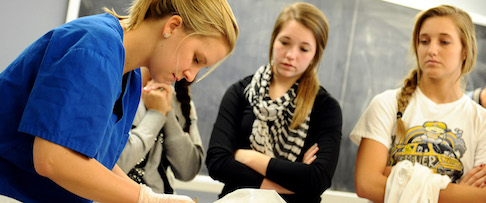A biology degree opens up a world of opportunity for your future. From pharmaceuticals to medicine, zoology to academic research, there are limitless career opportunities with a Bachelor of Arts in Biology. Westminster’s experiential approach within our classrooms produces graduates ready for real-world applications of their degrees. Our biology students go on to intern and work for major public and private corporations, including the Saint Louis Zoo, the Missouri Department of Health, Duke University Hospitals, Langan Engineering in New York City, and Cerner Corporation. They have pursued advanced degrees at elite institutions like Wake Forest University, New York University, the University of Chicago, and the University of Missouri system.
With a focus on hands-on problem-solving experiences in our state-of-the-art labs, you’ll be prepared for whatever future goals you wish to achieve.

Prepare for a career in medicine or health professions with hands-on human cadaveric dissection.
With Westminster College’s Biology degree, prepare to get your hands dirty as you study the origins of life. You can study organisms and processes that will expand your understanding of the local ecosystem. Or how about studying genetics to better understand the building blocks of humanity? You can even take our Human Gross Anatomy cadaver course and learn more about advanced modern medicinal technology. Plus, the Biology Department regularly sponsors summer research trips to locations such as Belize, Kenya, Peru, and Ecuador, including the famed Galapagos Islands, where you’ll be able to take the lessons you learn in the classroom and apply them in a real-world research setting.
Students are required to take two introductory-level classes (8 credit hours) before moving into more intermediate-level courses (8 credit hours). Once these introductory courses are complete, students must take five courses in Level Three, our most advanced coursework. You’ll be encouraged to complete independent research and participate in internships that will prepare you for graduate and professional schools, as well as careers in a variety of fields.
We also invite students to participate in the Undergraduate Scholar’s Forum where you’ll present original research to your peers and faculty. You could even take your data to regional and national conferences with the encouragement and support of your faculty mentor.
Explore the course catalog to learn more about available course options and degree requirements.
“Westminster’s liberal arts focus not only gave me a broad education that I have used ever since and in many different ways, but leadership opportunities while attending Westminster have forever instilled a sense of civic duty that I have brought to every position I have served in over the years.”
Floyd Shockley Entomologist and Collections Manager for the Department of Entomology at the Smithsonian National Museum of Natural History in Washington, D.C
Students will receive a Bachelor of Science in Biology upon completion of required courses.
Yes! Complement your invaluable Westminster education by pursuing a minor in biology, which will provide a broad introduction to the diversity of organisms and biological processes on Earth. No matter your goal, whether it’s to become well rounded professionally, knowledgeable about the world around you, or you simply enjoy biology, these basic tools can help you broaden your ecological and biological horizons and kick-start your next career.
The Introduction to Biological Principles, Biological Processes, and Biodiversity courses fulfill the general degree requirement for a course in laboratory science as well as serving as a foundation course for students considering a biology degree. However, the Introduction to Biological Principles is primarily intended for non-majors and recommended for those seeking a minor in biology. To complete the minor, students must take two introductory level courses, two courses from the intermediate level, and two courses from the advanced level.
Yes! Nearly all of our students get first-hand research experience. There are two ways for you to be involved in research. One, there will be opportunities in some of the courses to do independent projects in the lab. Or, if you have a hypothesis of your own or want to work with a faculty on their research, you can get independent study course credit for it!
Yes! If you enroll in Human Anatomy, Gross Anatomy, or pursue an independent prosection, you have multiple opportunities to spend hours working with the human donors. For example, many of our pre-dental students have worked on prosections of the face and pre-podiatry students have made prosections of the foot.
Yes! Many of our lab classes include time out in the field learning research techniques. For example, in Ornithology, you will spend time outside identifying birds by sight and sound or in Ecology you will sample aquatic insects and identify tree species.
Yes! Career Services provides help with internships, shadowing experiences, and the fundamentals of the interview process. The Biology Faculty’s coursework is aligned with topics covered on the major Admissions Tests (MCAT, DAT, PCAT) and can assist you with mock interviews and prepping all aspects of your applications. We’re here to help!
Our biology students have varied interests and are active across campus. Many are involved in the Pre-Healthcare Professionals Club (PHCPA), Peer Health Educators, Tri-Beta the National Biology Honor Society, and involved in many service activities throughout the community. Many biology students are also active in athletics, choir, and Greek Life.